#Living as an Ordinary Radical
Text
Being the Spice of Life
I just can’t complain about anything, but I sure could if I let myself go there. But I can’t complain at all, especially when I see others with tremendous physical issues, heartbreak issues, homeless issues, and so many other issues.
I was touched by Shane Claiborne’s book, “The Irresistible Revolution”, subtitled “Living as an Ordinary Radical”. The book describes what a truly Christian…
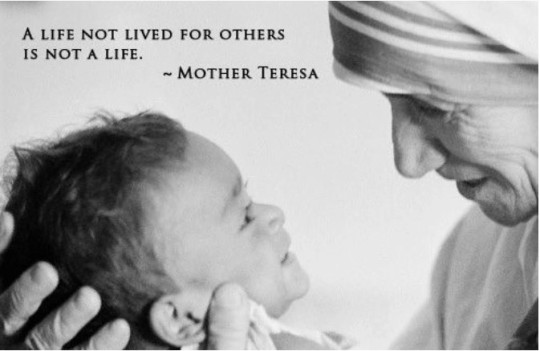
View On WordPress
#blog#bucket list#christian#Complain#deformed feet#flavoring#following Jesus#inspiration#Living as an Ordinary Radical#Mother Teresa#self denial#selflessness#shane claiborne#spice of life#St. Teresa of Calcutta#surrender#taking up her cross#The Irresistible Revolution
0 notes
Text
the thing about andor season 1 being a moses arc is that cassian andor literally is moses. once you mention that moses’s rise to leader serves as scaffolding to almost every major character moment for cassian well you just can’t unsee it
#cassian andor#even the changes i'm still hmm on#his backstory is so extremely moses coded! there's a foreign woman who takes him from his culture and people and language#he might live because of it but his perpetual cycle of fleeing and exile and exodus starts as a child#she gives him a new name and takes his past#as an adult he kills the guard(s)#he flees into the wilderness#he becomes a shepherd (even if its just undercover)#his people are living in the house of slavery#he becomes a prisoner#he uses water- small and massive unthinkable amounts of flowing water- to lead an entire prison revolt#he ends up in exile and diaspora again and again#and the season ends with a miniature exodus of his comunity from ferrix with bix and brasso and jezzy and wilmon and b2emo#but on a meta level like: this entire season is cassian at the burning bush#he's a man with unclean lips who neither thinks himself worthy of being the hand of deliverance#nor does he think exodus is possible#like even that very meta arc change from dyed in the wool born revolutionary to good man in constant exile who finally turns and faces the#burning bush#that is MOSES coded. i don't know how to feel about those changes but i DO love the idea that#it's cassians' imperfections and time as an ordinary man among the people that give him the radical empathy and experience precisely to#/become/ this leader I OF UNCLEAN LIPS etc#also well does he ever reside in the promised land
149 notes
·
View notes
Text
I am by no means an expert but just from staying up to date with news and watching the conversations around palestine i've noticed that Hamas occupies this sort of double state in zionist talking points. They are, at once, both a baby-beheading human-shield-using terrorist force so horrible and cruel to its own people that it's actually Hamas that Palestine needs to be freed from. And Gaza's elected and wanted leaders with high support from the average palestinian, making every single palestinian civilian dying by israeli airstrikes a terrorist supporter.
These two modes of thinking are fundamentally incompatible but they get switched out depending on which one is most effective at the moment for justifying the continued mass murder of palestinians. Either israel bombing gaza is good for the average palestinian civilian because it'll result in the destruction of hamas, or palestinian civilians don't exist at all and it's all just bloodthirsty terrorist who deserve to die anyway.
#the truth is that hamas is a terrorist organization and that many of its highest leaders aren't actually in palestine#but live outside the country while ordinary people get bombed#AND that the radicalization that makes them possible is the inevitable result of the violent occupation and suppression in palestine#hamas only exists because the occupation does. you don't need to support or excuse them to realize that.#And you also don't need to support or excuse them to realize that their use as an excuse to facilitate palestinian genocide is horrid#hamas being horrible does not equate to justification for killing 7000 people#including thousands of children#palestine#free palestine
20 notes
·
View notes
Text
The idea that Noa was just an ordinary ape who used to hang out with his friends, living a peaceful life in his village with no other aspirations than to live the life he had seen the adults around him live, would change radically just because one day Mae decided to steal food, is something that lives rent-free in my head all the time. One day you find a scavenger stealing your sustenance, and before you know it, everything you thought about the world is absolutely a lie, and that scavenger turns out to be an intelligent being whom, for some reason, you can't stop looking at for even a single moment, and nothing makes any damn sense anymore. Simply poetic.
#and some people say they don't see any romantic on this#like c'mon#kingdom of the planet of the apes#nomae#planet of the apes#kotpota mae#kotpota noa#mae x noa#noa x mae#mae#noa#kotpota
780 notes
·
View notes
Text
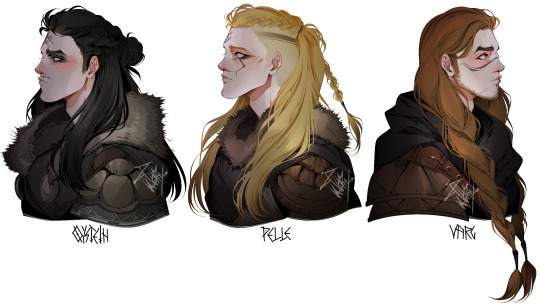
Øystein, son of Aarseth, is the one and only son of the King of Norway. He's the innate leader of the viking army, conquistador and future ruller of the North Sea empire.
He's known to be fearless, radical, and merciless towards his enemies, a brilliant strategist, but an arrogant and selfish commander.
Pelle is the first child of a noble family from Stockholm. Although he never had an inclination for heroism (nor enough stamina for it), he became a viking at the peer pressure of his household.
After a near dead experience during one of the Swedish raids, he came back 'from the dead' as a shaman. He ditched the battlefield to be guided by gods to his new enlightenment. Although reluctant and resistant at first, his kin slowly became aware of his new wave of wisdom and his fortune-telling gift and proclaimed him a 'bridge between gods and mortals'.
Obsessed by death and the occult, Pelle embraced his new status as a nonhuman (how else, really)
After hearing about his powers, Øystein decided to kidnap Pelle for his own benefits. He made Pelle his personal clairvoyant and advicer, but didn't take him as a slave. He was Øystein's loyal companion during raids, following him everywhere and having a privileged place next to the smol and grumpy Majesty.
Varg was the son of a Jarl who had a very close companionship with the King, so (unfortunately) Varg and Øystein have quite a history together.
They never standed each other. At first, the animosity was one sided, but in time it became mutual.
Varg was only 11 years old when he had to follow his father to a congregation in Oslo. He and Øystein had a (seemingly ordinary) sword fight until Øystein cut Varg's face. Naturally, he got away with it, but Varg never forgot him for the humiliation he endured and the new scar that became a constant reminder of his weakness. This is when the hatred became dual.
10 years later, at his father's order, he had to join the youth's movement and become part of Aarseth's army. Arrogant, confident (or so he tries to portray himself), and revengeful, he gladly took the role of a viking, but the worst part had yet to come. He was rendered to have a close position to Øystein and to travel alongside him and his other minions (Jan, Jørn, Fenriz, Snorre, Faust, etc).
Fights occurred on countless times and if they were caught together in a 'life or death' situation, they would let each other simply die rather than work a way out, so the tension was always high, trust was non-existent and curtesy was another word for forced-agreeableness.
Øystein wanted to get rid of Varg as much as Varg wanted to obtain his revenge (kill him and take the throne), but in unfavorable circumstances there was little to nothing they could do (yet).
When Pelle entered the picture, Varg fell in love with his mystic beauty. He began sneaking out and postponing duties to spend time with the shaman.
Pelle's interest in the mortal way of living and human affection was limited, but he became fond of Varg to a certain extent.
Having both Øystein and Varg's trust put Pelle in a delicate position. Typically impartial, he tried his best to stay away from taking sides, but he couldn't deny the ever-growing antagonism between the two.
The story is basically about them having to survive the cold, the hunger, the fights and each other while Varg has a massive crush on Pelle, Pelle acts like he doesn't understand the languages and Øystein munches on elg meat.
#my art#my drawings#pelle ohlin#per yngve ohlin#dead mayhem#euronymous#mayhem band#mayhem fanart#øystein aarseth#varg vikernes#burzum#mayhem#true norwegian black metal#artists on tumblr#small artist#lords of chaos#euronymous mayhem
169 notes
·
View notes
Text
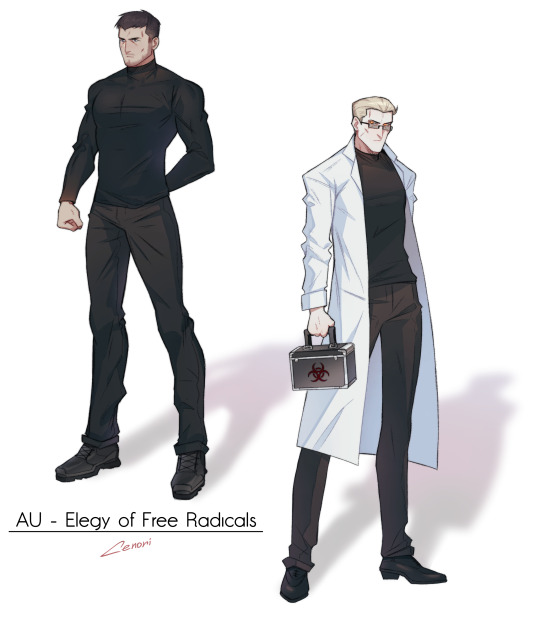
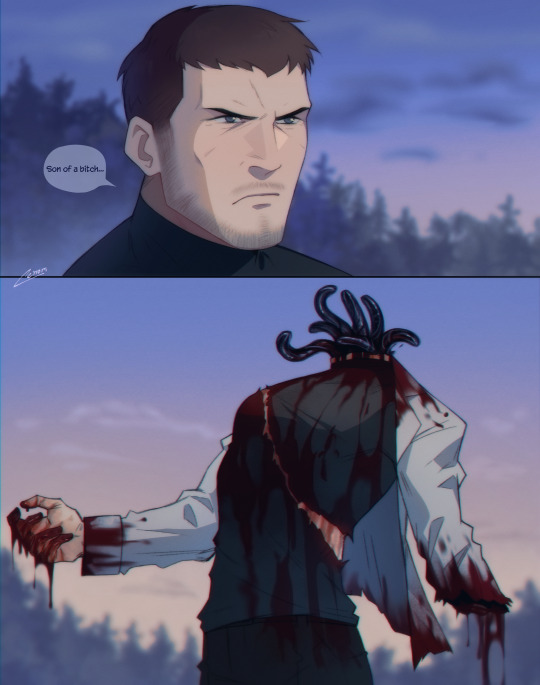
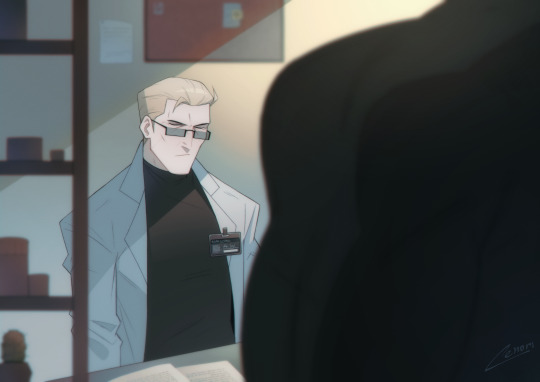
In 2021, dirty secrets about the use of bioweapons are revealed inside BSAA + there are direct hints in Umbrella Corps that Wesker is alive. I just combine the two puzzle pieces together in my head. So let's look at another interesting post-2009 scenario.
AU - ELEGY OF FREE RADICALS
Chris was once careless about eliminating Wesker. Knowing his nature, he still didn't check Wesker's presumed place of death properly. Relying on his own luck, Chris left the place of battle and never returned there. But he had to go back. It has become his mistake.
Chris reported the scene of the victory to the BSAA. Rotten BSAA could have used that data in any way they wanted. Like going back there and checking out the volcano. They could have indicated on the documents that they were headed to clear the area of the remnants of Uroboros, but in fact to search for Wesker's remains to get rich off the sale and study of his unique biomaterial. But what they didn't expect was to find him alive. Badly injured, helpless, but somehow alive.
Taking advantage of the weakness of the still living organism, he was taken to the secret laboratory of the headquarters. Now Wesker could be under the supervision of BSAA scientists for a very long time. He's much more useful alive than dead. His knowledge, skills, all of it could be utilized. And it was also possible to conduct endless experiments on his unusual body... Testing the limits of his abilities, testing various poisons, looking at the lethality of their new weapons, and etc. He was once again a puppet, as he had once been in Spencer's hands, from which he had miraculously escaped.
The BSAA kept Wesker's abilities under strict control, he was trivially stripped of any PG67A/W injections, replaced with an alternative that was only necessary for his body to regenerate damage after the battle in the volcano, but didn't provide any additional benefits. So he would remain weak but healthy.
Another remedy was also applied to him, eliminating the consequences of merging with the Uroboros, which modified his body in a volcano. It was discovered in 2011, after the events of Revelations 2. It was rude to call it just a serum, it was something more, because it did not remove the virus itself from the body, but brought it into a more stable form, allowing Wesker to take his ordinary appearance. With him, in this form, it became easier for employees to work.
The BSAA restored Wesker, stripped of his strength, any dignity, as well as his freedom. He was bedridden for several years and various weapons were tested on him, then recorded how his body reacted and at what rate it recovered.
An immobilized lab rat, a deserved punishment for someone like him?
Perhaps.
It was thanks to his "sacrifice" that the anti-regeneration weapon was invented, which had once come in handy for Chris in the battle against Mold.
Just think… how many things could the BSAA have invented using the infinite resources of Wesker's body? He was terrified of these thoughts. Terror at the realization that he had no chance of escape, that he was trapped here forever, that he would continue to have his organs taken out of him and be forced into endless pain. He reflected that he hadn't actually managed to do so many contradictory things to deserve eternal torment. And it's better to let him die than to endure this hell. But his own body played a cruel joke without dying. It was an expert on regeneration. His pride was trampled when he begged for death.
BSAA absolutely did not spend any painkillers and sleeping pills on Wesker, absolutely all experiments were carried out when he was conscious. They had already spent a lot of money on him during his recovery, it was a waste to spend even more on someone who could repair any of his damage.
Pain and terror haunted him for six years. He cursed what he used to idolize in himself.
And then he was forced to work for them. In 6 years he had grown accustomed to the constant pain and had already learned to see himself as nothing, sending his consciousness into free floating. Deep in his thoughts, he created a place where he learned to ignore the endless physical torment. But when he was put on his feet and pulled out of this place… Wesker was even more devastated.
It was unusual for him to suddenly return to normal work, all this created a mess in his head, reality seemed to be nonsense. The usual paperwork after hell? Are you kidding me?!
Morally, he was destroyed. His psyche was severely damaged. Wesker from the "torture room" was locked in a cell that looked like a combination of a room and a laboratory. For fear of being put back on the operating table again, he dutifully began to work and develop various things that BSAA would use in the future. But it wasn't life either. Weakened body, lack of abilities... he wanted to die, but he couldn't afford it, because he was practically immortal. Although, even if he used a weapon that stops regeneration on himself... he still wouldn't kill himself.
«Not here»
«Not like this»
At times he thought he was balancing on the fine line between normalcy and insanity. He saw people at best once every two weeks who came to check on his work and were not at all talkative. Wesker had always been convinced he didn't need company, but 12 years without socializing had made him question his beliefs.
Once a month he was provided with food, and then carelessly, because he didn't need food. His body, experiencing hunger, could devour itself and regenerate immediately.
The only reason he was given a room and released from the operating table was because the organization wanted to see what he could offer them. Of course, they didn't stop studying his unusual body and conducting experiments, but Wesker was already in charge of the process himself. Independently amputated his limbs and so on. Only closer to 2019 were these experiments stopped, because they had extracted all possible benefits from his body.
Wesker remotely, horrified, realized that thanks to his body he would live much longer than the average person, if not forever. Which led him to believe that he would be kept in this cage for centuries. BSAA would close, others would take their place, find him, torture him again. And so on in a circle, for all eternity, as long as human society and greed existed. This had to end... but how? A plan was needed, a complex one that could not be unraveled.
His life and existence was a BSAA mystery from 2009-2021. For 12 long years he was not allowed out of the walls of this cell.
Of course he wanted to escape, he had many unrealistic thoughts in his head about it. He was also interested in meeting Chris, aged, changed. To see his reaction, genuine shock rather than the anger he'd reacted to Wesker's earlier 'resurrections'. Is Chris even still alive today? What year is it now?
But this life couldn't go on forever, the BSAA was cracking at the seams. In 2021 it was revealed that they were using B.O.W. soldiers, something Chris couldn't ignore. So he headed over to European headquarters to deal with it - right where his nemesis was located, a complete headache. Chris couldn't accept that his organization, which was fighting biological weapons, would use them. It didn't fit in his head. He had long ago stopped trusting the BSAA, but this was the last straw.
Arriving there, Chris did not expect to meet someone in the basement laboratories whom he had buried a long time ago.
What was he going to do with him? Shoot him in the head without any thought? That would have been logical and in Redfield's character, but over the years he'd stopped being a complete hothead, learned to think first and then act. Gained a little equanimity.
It will turn out that it was Wesker who was involved in the creation of the B.O.W. in BSAA. Especially since these soldiers are improved clones of Chris himself. Who else could have come up with such an idea? Only to a man who thought Chris was "one of his best men".
For the past 6 years, Wesker has been forced to be an advisor to BSAA, sharing all the knowledge and ideas. He might have been able to pull it all off, if only to get back at that organization, turning Chris' anger on it, and turning his attention to himself at the same time. After all, only this "one of his best men" was the only one who could save him. Yes, Wesker was pathetic. He felt he wasn't even worthy of his former name, being so pathetic as to enlist the help of his enemy. But it was the only option. There was no more talk of pride.
However, it didn't matter now, Chris had come here to punish the founders, so their prisoner, their chief counselor, might prove to be the best informant. And an ally.
Natural intuition made Chris believe his former enemy, the biggest manipulator of them all. As if he was definitely not lying now, because he was in such a big asshole that he couldn't let his words sound unconvincing. Earlier, Chris would have easily recognized his lies, but not now. Right now, completely honest and dull eyes were looking at him from beneath translucent glasses. So damn pitiful that Chris automatically assumed the role of the hero rescuing the damsel in distress.
Chris was quickly combine the information together in his head: the situation, the physique, the setting... His opponent had been held hostage by his own ambition, it couldn't help but bring a smile to Redfield's face. But he hid it in his thoughts, because he deemed it inappropriate once he read Wesker's imprisonment papers. Chris had some free time to devote to the situation.
He read about what had been done to Wesker. About all the torture. And Redfield clutched his head, when he got to the description of his ammunition that he'd used against Mold a couple years ago. He was terrified that this weapon had been created in such a gruesome way... through the suffering of his enemy, who, even considering all his guilt, didn't deserve all this. Chris felt that Wesker should have died and rid the world of himself rather than suffer endlessly. Even for him, he thought it was inhumane.
The first thing Wesker said to Chris was:
- Now you've taken on the role of captain of the «alpha» too.
This jabbed Chris slightly, but he noticed how the hostage said it without malice. Redfield involuntarily remembered 1998, the mansion, the betrayal, the deaths of the Alpha and Bravo group...
The compartment Wesker was in was to him both an office and a laboratory, and a room. A kind of prison, which he could not leave on his own because of his weak physical condition. He was weakened by the daily injections putting his viruses inside his body to sleep.
Releasing him and examining him at arm's length, Chris made sure that in the state Wesker was in now, he posed no danger, just an ordinary disgust. He resembled only a pale copy of his former self.
The BSAA operative dragged him carelessly behind him like some sack of garbage, concerned only with keeping the information in his head intact. But in his mind Chris still held images of what the BSAA bastards were doing here to Wesker. He didn't want to feel sorry for him, but he couldn't control it, Redfield had never been heartless. Initially he had only cared about information, but it wasn't long before he didn't even notice how protective he had become of him. As if a friend, which in truth, he never was. His captive's behavior was different from what Chris remembered. It was different, like a throwback to the past. Perhaps 12 years of imprisonment had had that effect on him.
He was docile, which wasn't surprising, since Wesker had been treated like an object by the organization, and the operating table had been a good teaching moment. Chris couldn't believe that after so many years of hell his former enemy's mind was still intact, that he hadn't lost his mind and was capable of dialog.
Time passed unnoticed during the proceedings with the BSAA about B.O.W., eventually the organization was destroyed and all its equipment, along with Chris's squad, transferred to TerraSave.
Chris during all of this had to sign Wesker into the Hound Wolf Squad as either a prisoner or an advisor. To keep him from getting shut down again, that was the deal. He helps them, they help him. Over time, he was getting back to normal. The food and good company had done their job.
However, Chris didn't know that his new ally hadn't lost all of his strength, and the ones he had were sleeping under the influence of the medicament. But time passed, the medicament slowly stopped working without new doses, and Wesker understood it perfectly well. And felt it. It didn't affect his appearance, so he could play his role for as long as he wanted. But was it a role? Sure he was portraying a courtesy that annoyed Chris to the point of nausea, but it was partially sincere. Having broken with his past at the fault of the BSAA, Wesker could only hope to find a new purpose. After all, as Spencer had raised him, there is no life without purpose.
Therefore, was it so necessary for him to betray Hound Wolf Squad? Would it be beneficial to him? Chris is a strong point. He has no doubt that if he kills Redfield - another will take his place, and will definitely get him into the basement wheel of samsara. So Wesker had no grand plans yet. After all, any of them would be doomed to failure as long as there was anyone in the world capable of resisting.
But Chris risked to give him a goal, which, however, called impossible - to become the best version of himself. To help the Hound Wolf Squad, to work with TerraSave, to use his knowledge for something other than endless failed experiments. Stop being Spencer's failed experiment. The only option Chris would give him a chance at.
Those words stuck in Wesker's head for a long time. Mentioning the old man was like a low blow. Chris knew where it hurt the most.
It had been several years since Wesker had joined Redfield's team. All that time he'd been hiding his abilities so as not to lose the fragile trust in his person. But the truth couldn't help but surface one day....
On one of the missions connected with B.O.W., the blade of an exploding helicopter blew off Wesker's head, and then another piece of debris cut his body in half.
But he didn't die.
Chris was enraged. With resentment, he felt cheated. What else could he have expected?
First, the black mass connected the body, restoring functionality to it, and then this silent carcass picked up the head. It was slow. It looked helpless and creepy. Chris's squad was on edge, but he ordered to wait. The black substance emerged from the base of the neck and attached the head to itself, then the calm expression on the reanimated head changed to horror. Was he in unbearable pain from the newly received oxygen? Or from the fusion of tendons?
When Wesker recovered, he couldn't at first think of a response to Chris' "explain yourself!"
Everyone's fragile trust collapsed, but not Redfield's, for he knew that if his former adversary had wanted to betray him, he would have betrayed him long ago, he wouldn't have let himself be so ridiculously exposed. Especially after all the torture he'd endured. Chris could understand why Wesker was hiding his powers. Redfield had stepped on the same rake of trust again, convincing himself that he had everything under control.
Wesker, ever since the prototype had merged with Uroboros in his body, had acquired a number of flaws, chief among them an unbearable sensitivity to pain. The only time he could not feel pain was when he was BSAA injected with force restraining drugs. But without them, all the disadvantages came out.
Whereas before he could recover from any wound without feeling anything but minor damage, now the pain was so obvious that every regeneration was accompanied by agony. Especially if it was a burn, for heat is a major weakness for Uroboros. The healing places on his body, after that helicopter situation, hurt like hell.
He was closer to human now than he had been before, and Chris seemed to realize that. That was why he hadn't killed him a second time, but had accepted him back into his squad. It was not only a gesture of goodwill, but also a precaution, a way to keep a dangerous object as close to him as possible so he wouldn't do anything.
How long will they have to cut off the heads of hydra in the face of the creators of bioweapons?
- Why do you trust me, Chris?
- I still believe that anyone can become the best version of themselves. We should prioritize fighting for the future to give someone a quiet life that you and I have been robbed of. I know about Project W. Together we can stop new organizations and prevent many tragedies like this from happening again. And you can help us, Wesker. BSAA took away your choice, but I'm giving it to you now.
Wesker at first couldn't find the words to respond, but after a moment he barely audibly whispered: "Thank you."
From a man who never thanked anyone, Chris was shocked to hear that. And he was proud of him.
Had he forgiven him? No, his deeds were unforgivable. But Chris wasn't the kind of man who would turn his back on his one chance to make things right, to make things right on Earth, to save someone's life. In this truce, he sees a future that's bright for everyone.
821 notes
·
View notes
Text
Planets in the 11th house
The Eleventh House, often called the House of Friends, highlights the strength we find in connections. It's about the power of groups, clubs, and organizations that shape our lives. Within these circles, we discover our potential and grow into our true selves. This house also resonates with our dreams and hopes. It encourages us to envision and work towards our best selves. In the Eleventh House, Aquarius, Saturn, and Uranus reign.
The Sun: in the 11th house fuels a drive for elevating group goals, often leading you to influential friendships and a leadership role within communities. Your open-minded and responsible approach aims for positive change, driven by a desire to empower and uplift. Embrace your social influence, using it to make a meaningful impact on the world around you.
The Moon: in the 11th house often brings female friendships and a sense of security through group belonging. Your nurturing instincts find expression in humanitarian pursuits, valuing collective well-being over personal gain. Working for the group's benefit is fulfilling, driven by your empathy and responsiveness to others. Within your career, friendships play a crucial role, shaping opportunities and enduring beyond tasks. Prioritize a sense of belonging to nurture your emotional well-being, guarding against detachment from your feelings.
Mercury: in the 11th House bestows an ingenious, adaptable, and intellectual mind. Achievement revolves around mental prowess. Friendships, especially with younger individuals or diverse perspectives, energize you. You thrive as a communicator within groups, perhaps as a spokesperson or secretary. Your innovative problem-solving talents shine, but seeking intellectual nourishment from your community remains vital for your growth.
Venus: in the 11th House, your friendly and tactful nature attracts a circle of helpful friends. While your nurturing spirit enhances connections, ensure self-care isn't compromised. You radiate grace in group settings, enjoying diverse activities and fostering ease. Your allure for the unique draws you to like-minded souls, creating a harmonious social presence.
Mars: in the 11th House ignites strong desires and leadership qualities, magnetizing energetic and enterprising friendships. Use caution in choosing the right companions, as you may give too much or inadvertently exploit. Active engagement in group pursuits suits you, inclining towards leadership roles. Your loyal and dynamic nature often makes you the go-to friend, embodying the role of the supportive leader within your circle.
Jupiter: in the 11th House, you thrive through social networks and group dynamics, finding success in business and leadership roles. Your charisma and global outlook make you a natural influencer. While your altruistic drive is commendable, keep aspirations within reach, allowing your positive impact to flourish among friends and the community.
Saturn: in the 11th House brings enduring acquaintances and a sense of duty to purposeful groups. You're drawn to serious connections and work diligently for collective goals, often with limited personal recognition. Patience and hard work lead to later rewards. While feeling distinct might bring challenges, value your unique essence without isolating yourself. Prioritize quality over quantity, nurturing close bonds while overcoming the fear of exclusion.
Uranus: in the 11th House signifies intuitive originality and a strong creative streak, driven by humanitarian ideals. Unconventional friendships with like-minded individuals are common, though you may seem aloof at times. Your rebellious spirit and reformative tendencies stand out, advocating constructive change. Embrace your unique essence, attracting those who resonate with your radical perspectives. Your path is meant to diverge from the ordinary, inspiring transformation.
Neptune: in the 11th House can blur boundaries between self and group, seeking acceptance and compassion within collective ideals. While enjoying group immersion, remember the distinct energy it holds. Your dual nature lets you perceive hidden dynamics, even amid the allure of unity. Empathy guides you, understanding the fine balance between individuality and collective purpose. Cultivate healthy boundaries to avoid being exploited while staying true to your compassionate connections.
Pluto: in the 11th House grants keen awareness of power dynamics within groups, triggering a cautious approach. Sensing motivations and avoiding exploitation becomes second nature. While this can be draining, it shapes a close-knit circle of trusted friends. You may shy away from institutions or new acquaintances due to trust issues. Reconnect with your heart, embrace your uniqueness, and nurture genuine connections that rekindle your spirit.
#astro observations#astro community#astro placements#astrology#all signs#astro notes#for you#asteroid#zodiac placements#astrologer
595 notes
·
View notes
Text
i think part of the reason that machines and obsolete pieces of technology are so viscerally interesting to us is because they remind us of our own bodies. things with buttons and levers and wires not only invite physical interaction (which is something beautiful and potentially radical in and of itself!!) but are easily anthropomorphized in that their heft and clunkiness elicit a sort of empathy in us. we realize that our bodies are not so different from machines, and it’s not because our bodies are sterile and cold and unfeeling, but because we all have these tangled insides and a desire to touch and to take up space in the world. we have such complicated relationships to our own bodies and we like tech that shows us how it can be touched and how it was assembled and how it can work and how it can fail. it is kind of body horror. it’s grotesque and erotic. we also realize that analog devices are being replaced and phased out of existence, and so there’s even more of an impulse to connect with them.
newer designs tend to emphasize sleekness and thinness and quiet and invisible parts and instantaneous results. i’ve heard of macbooks and iphones being described as sexy. they are not. a real sexy machine evokes the heat and weight and grittiness and entangledness of sex. so the condensing of functions into one tiny digital device and the storage of information in some invisible cloud and the forced reliance on a few entities that control the ‘progress’ of all that—as freeing as all of that can be in many ways that are worth considering, the implications for the future of our own bodily autonomy can definitely be frightening. i think that’s why it’s important to be intentional and interested in our physical interactions with any kind of object, but especially the old and the ordinary ones. to insist that they not become obsolete to us, and to insist on our ability to choose how they fit into our lives. that can be a sort of resistance to capitalism i think, that can start on the smallest level. that’s mostly what it boils down to, to me.
#okay lila bodymachine thesis moment lol#idk what to tag this#i’m not using my brain as much as i could be with this but u get it#also i’m not talking abt the labor aspect here. the relationship between worker and machine is for a different post.#anyway ik we do talk abt this stuff a lot but i just wanna acknowledge it#eroticism of the machine#or something
1K notes
·
View notes
Text
best books I read in 2023:
sophie strand, the flowering wand: rewilding the sacred masculine
alex iantaffi, gender trauma: healing cultural, social, and historical gendered trauma
matthew desmond, evicted: poverty and profit in the american city
betty dodson, sex for one: the joy of selfloving
ching-in chen, andrea smith, jai dulani, the revolution starts at home: confronting intimate partner violence within activist communities
robin stern, the gaslight effect: how to spot and survive the hidden manipulation others use to control your life
nick turse, kill anything that moves: the real american war in vietnam
lori fox, this has always been a war: the radicalization of a working class queer
arline t. geronimus, weathering: the extraordinary stress of ordinary life in an unjust society
roxanne dunbar-ortiz, not a nation of immigrants: settler colonialism, white supremacy, and a history of erasure and exclusion
eyal press, dirty work: essential jobs and the hidden toll of inequality in america
rabbi danya ruttenberg, on repentence and repair: making amends in an unapologetic world
michelle dowd, forager: field notes for surviving a family cult
starhawk, the empowerment manual: a guide for collaborative groups
betty dodson, orgasms for two: the joy of partnersex
timothy snyder, black earth: the holocaust as history and warning
kidada e. williams, I saw death coming: a history of terror and survival in the war against reconstruction
judy grahn, another mother tongue: gay words, gay worlds
jennifer m. silva, coming up short: working-class adulthood in an age of uncertainty
susanna clarke, piranesi
megan asaka, seattle from the margins: exclusion, erasure, and the making of a pacific coast city
starhawk, truth or dare: encounters with power, authority, and mystery
laura jane grace, tranny: confessions of punk rock’s most infamous anarchist sellout
molly smith, revolting prostitutes: the fight for sex worker's rights
richard c. schwartz, you are the one you've been waiting for: applying internal family systems to intimate relationships
timothy snyder, our malady: lessons in liberty from a hospital diary
peter levine, trauma and memory: brain and body in search for the living past
kylie cheung, survivor injustice: state-sanctioned abuse, domestic violence, and the fight for bodily autonomy
timothy snyder, bloodlands: europe between hitler and stalin
joan larkin, a woman like that: lesbian and bisexual writers tell their coming out stories
cj cherryh, hammerfall
261 notes
·
View notes
Text
By Sean Coughlan
BBC News
A diary written by a Yorkshire farmer more than 200 years ago is being hailed as providing remarkable evidence of tolerance towards homosexuality in Britain much earlier than previously imagined.
Historians from Oxford University have been taken aback to discover that Matthew Tomlinson's diary from 1810 contains such open-minded views about same-sex attraction being a "natural" human tendency.
The diary challenges preconceptions about what "ordinary people" thought about homosexuality - showing there was a debate about whether someone really should be discriminated against for their sexuality.
"In this exciting new discovery, we see a Yorkshire farmer arguing that homosexuality is innate and something that shouldn't be punished by death," says Oxford researcher Eamonn O'Keeffe.
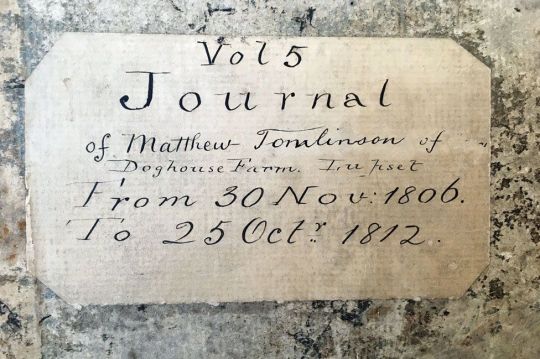
The diaries were handwritten by Tomlinson in the farmhouse where he lived and worked
The historian had been examining Tomlinson's handwritten diaries, which have been stored in Wakefield Library since the 1950s.
The thousands of pages of the private journals have never been transcribed and previously used by researchers interested in Tomlinson's eye-witness accounts of elections in Yorkshire and the Luddites smashing up machinery.
But O'Keeffe came across what seemed, for the era of George III, to be a rather startling set of arguments about same-sex relationships.
Tomlinson had been prompted by what had been a big sex scandal of the day - in which a well-respected naval surgeon had been found to be engaging in homosexual acts.
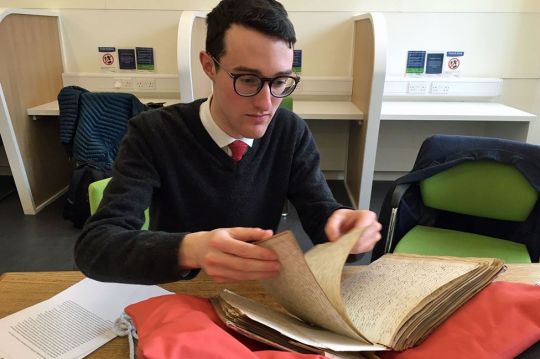
Historian Eamonn O'Keeffe says the diaries provide a rare insight into the views of "ordinary people" in the early 1800s
A court martial had ordered him to be hanged - but Tomlinson seemed unconvinced by the decision, questioning whether what the papers called an "unnatural act" was really that unnatural.
Tomlinson argued, from a religious perspective, that punishing someone for how they were created was equivalent to saying that there was something wrong with the Creator.
"It must seem strange indeed that God Almighty should make a being with such a nature, or such a defect in nature; and at the same time make a decree that if that being whom he had formed, should at any time follow the dictates of that Nature, with which he was formed, he should be punished with death," he wrote on January 14 1810.
If there was an "inclination and propensity" for someone to be homosexual from an early age, he wrote, "it must then be considered as natural, otherwise as a defect in nature - and if natural, or a defect in nature; it seems cruel to punish that defect with death".
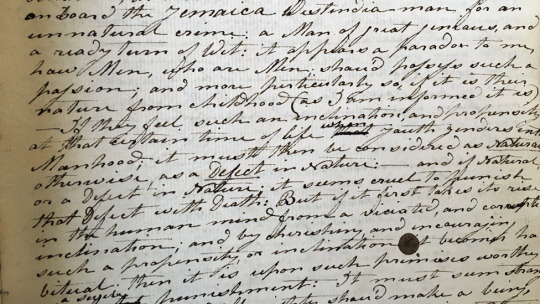
The diarist makes reference to being informed by others that homosexuality is apparent from an early age - suggesting that Tomlinson and his social circle had been talking about this case and discussing something that was not unknown to them.
Around this time, and also in West Yorkshire, a local landowner, Anne Lister, was writing a coded diary about her lesbian relationships - with her story told in the television series, Gentleman Jack.
But knowing what "ordinary people" really thought about such behaviour is always difficult - not least because the loudest surviving voices are usually the wealthy and powerful.
What has excited academics is the chance to eavesdrop on an everyday farmer thinking aloud in his diary.
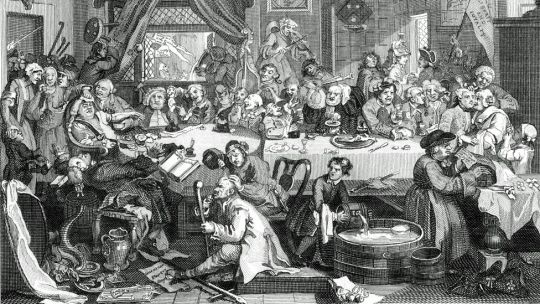
Tomlinson was appalled by the levels of corruption during elections
"What's striking is that he's an ordinary guy, he's not a member of the bohemian circles or an intellectual," says O'Keeffe, a doctoral student in Oxford's history faculty.
An acceptance of homosexuality might have been expressed privately in aristocratic or philosophically radical circles - but this was being discussed by a rural worker.
"It shows opinions of people in the past were not as monolithic as we might think," says O'Keeffe, who is originally from Canada.
"Even though this was a time of persecution and intolerance towards same-sex relationships, here's an ordinary person who is swimming against the current and sees what he reads in the paper and questions those assumptions."
Claire Pickering, library manager in Wakefield, says she imagines the single-minded Tomlinson speaking the words with a Yorkshire accent.

There are three volumes of Tomlinson's diaries at Wakefield Library
He was a man with a "hungry mind", she says, someone who listened to a lot of people's opinions before forming his own conclusions.
The diary, presumably compiled after a hard day's work, was his way of being a writer and commentator when otherwise "that wasn't his station in life", she says.
O'Keeffe says it shows ideas were "percolating through British society much earlier and more widely than we'd expect" - with the diary working through the debates that Tomlinson might have been having with his neighbours.
But these were still far from modern liberal views - and O'Keeffe says they can be extremely "jarring" arguments.
If someone was homosexual by choice, rather than by nature, Tomlinson was ready to consider that they should still be punished - proposing castration as a more moderate option than the death penalty.

Tomlinson's former home was still there in the 1930s (bottom left), but has since disappeared beneath housing and a golf course
O'Keeffe says discovering evidence of these kinds of debate has both "enriched and complicated" what we know about public opinion in this pre-Victorian era.
The diary is raising international interest.
Prof Fara Dabhoiwala, from Princeton University in the US, an expert in the history of attitudes towards sexuality, describes it as "vivid proof" that "historical attitudes to same-sex behaviour could be more sympathetic than is usually presumed".
Instead of seeing homosexuality as a "horrible perversion", Prof Dabholwala says the record showed a farmer in 1810 could see it as a "natural, divinely ordained human quality".
Rictor Norton, an expert in gay history, said there had been earlier arguments defending homosexuality as natural - but these were more likely to be from philosophers than farmers.
"It is extraordinary to find an ordinary, casual observer in 1810 seriously considering the possibility that sexuality is innate and making arguments for decriminalisation," says Dr Norton.
Who was the writer of this diary?
Matthew Tomlinson was a widower, in his 40s when he wrote his journal in 1810 - a man of a "middling" class, not a poor labourer but not rich enough to own his own land.
"I try and imagine how he would have looked," says library manager Ms Pickering.
There are no pictures of Tomlinson, who is thought to have lived between about 1770 and 1850.
"Very dour," she suggests. And a "bit of a hypochondriac".

There are thousands of pages of handwritten journals - but some volumes appear to have been lost
"I imagine if you stopped him at his gate for a chat he'd talk about his gout more than anything else.
"I'd love to have a conversation with him about what Wakefield was like at the time," she says.
No-one knows how these private diaries, covering 1806 to 1839, ended up in Wakefield Library, but they were there by the 1950s and are presumed to be part of an earlier acquisition of old books and local documents.
There are three surviving volumes and at least another eight are missing.
But they show vivid detail about life in Wakefield in the early 19th Century.

Tomlinson, from his home at Doghouse Farm, recorded the life of nearby Wakefield
During elections, Tomlinson was appalled by the corruption, the rum drinkers having to be carried home in wheelbarrows and the "hired ruffians".
And at Queen Victoria's coronation he was sceptical about expensive ceremonies and celebrations, calling them all "humbug".
This was not a closed world. His social circle seemed to be avid readers of books and newspapers, following reports of revolutions abroad and riots and insurrections at home.
They saw elephants marching through Wakefield in a circus parade and military bands who had competed to hire the most talented black musicians.
We know where he lived - Doghouse Farm in Lupset, because he carefully wrote it on the front of his journals.
The farm, at the edge of the landowner's estate, is now under a housing estate and a golf course. All that survives are his diaries.
700 notes
·
View notes
Text
Revelations during tonight's dinner conversation with my dad:
His father was a top secret class engineer at a big aerospace company who worked on the Echo satellite program. He was highly placed enough that several times during the cold war, the infamous "men in black" came and removed him from the house to (presumably) Cheyenne Mountain in case of nuclear strike. They were fine leaving my grandma, uncle, and dad to die, though. 😨
The "men in black" came to talk to my dad's teen brother one day out of the blue and demanded all correspondence from his stamp-collecting Norwegian pen pal with whom he had been trading stamps and boys' magazines. His pen pal was a 58-year-old Russian spy. 😧
My dad was a courier in the Vietnam War with top secret clearance, running communications through active combat zones. I did not know this. He once risked his life to deliver a mislabeled order past a firefight - an utterly trivial order for flags on the base to be flown half-mast that had been labeled top secret. Heads rolled for that. 😬
The park across the street from the house I lived in my whole life and he lives in still was at one time partially a cemetery containing about 30 gravesites. They were supposedly all moved, but you know how it is. You can't be sure they found or bothered to remove everything. This explains why the park was so creepy, why the perfectly ordinary 50s-era ranch house had vibes so septic and haunted even my dad could sense it, and why I felt watched, always, from every window in the house that faced that park. 😱
None of this is touching the time he and his group of coworkers were mistaken for bank robbers and almost killed by small-town cops, the time his twin prop plane lost an engine and almost crashed over the Sea of Japan, the time he caught a several million dollar accounting mistake for his company before it tanked their international branch, or why he is partially responsible for why swipe-to-pay credit card machines were for a short while RADICALLY different, not standardized, and very frustrating to operate (but he saved thousands of regular people from potential fraud).
714 notes
·
View notes
Text
Many people liked the last part. Thank you very much, I'm very pleased 🥰🤧💜
I suggest you continue. Today there will be Tartaros.
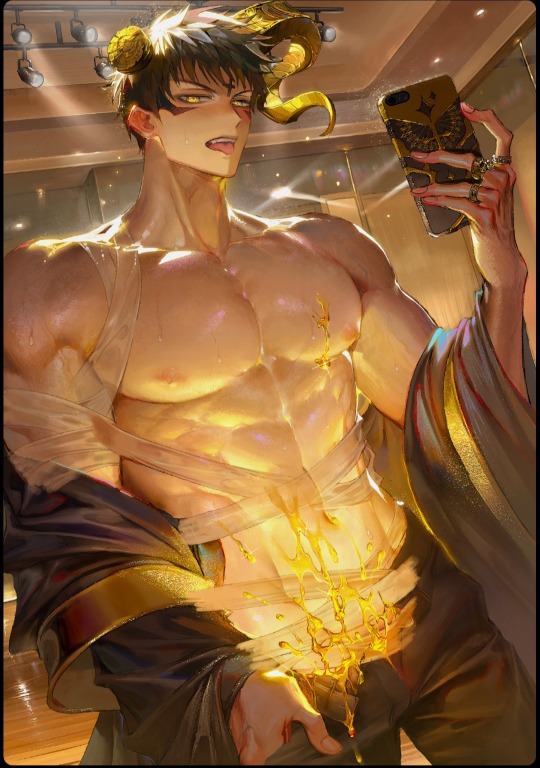
Greedy, majestic and arrogant, Mammon literally glows with gold. His feet are framed in gold. He wears a brown robe. Tartaros' clothing is of Chinese origin. I think this is no secret - the region of greed itself was founded in China. This can be seen in buildings and clothing. But the culture, in my opinion, is completely different. I'll figure this out later
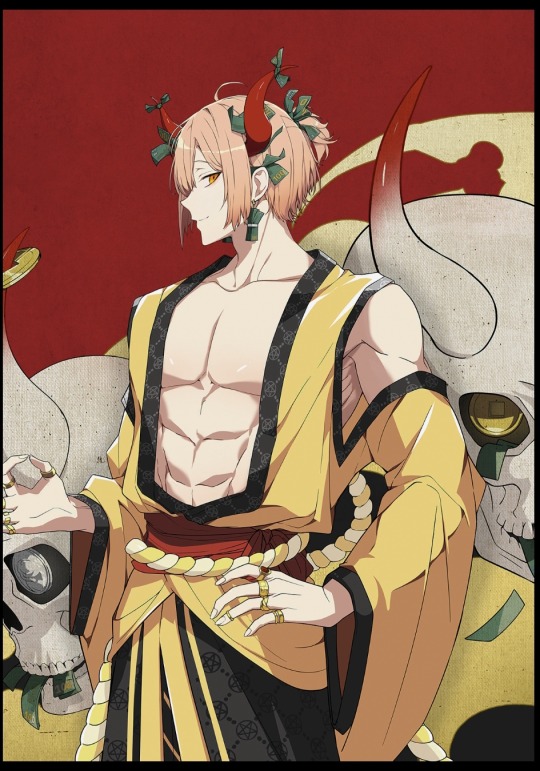
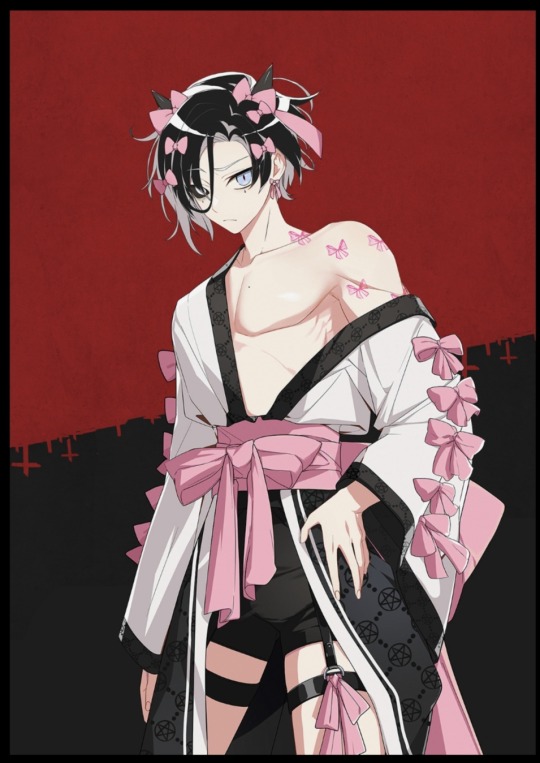
Unlike other regions that I previously examined, in Tartaros the clothing, even among high ranks, is radically different. The clothes are united only by the Chinese style.
Bimet is Mammon's right hand, and one of two demons who has something (or someone) behind his back. What kind of skulls are these? His pets? Piggy banks for money? Who knows.
Many of the demons of Mammon have money woven into their hair. Bimet is one of them. I would like to note that all the demons of Mammon (except Valefor)walk with an open chest. Everyone also has their own way of tying their cape using a belt. Mammon has an ordinary one what the fuck call it tape. What’s strange is that Mammon, in my opinion, dresses very simply for the King of Greed.
Bimetan's belt is a Shimenawa rope. This rope is from Japanese mythology, but why not?...Such ropes are tied around sacred places and trees, noting that spirits live here.
Eligos distinguished by its cuteness. Bows, pastel colors, naturally erotic in the form of suspenders. Instead of money, he has the same bows in his hair. He is almost nothing but a bow himself. There's even a bow on the belt.
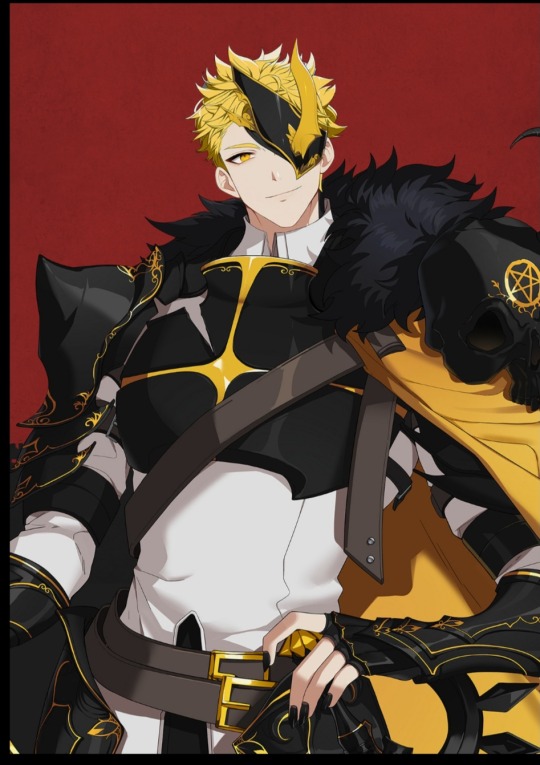
And the last one is Valefor. He's a knight, as far as I remember. And naturally his clothes will be different. His palette is black, yellow and white. I don’t know how strong the armor is, but the stomach is open, and this is an error. A very soft and vulnerable place remains open. But if he is a good enough soldier, then the absence of this part will not change anything. I really like the adaptation of the shoulder pad into a skull with a pentagram. It looks unusual.
Something like that. On the one hand, I don’t even know what to say about Tartaros, but on the other, I’ve written so much.
Thanks everyone for reading! ☺️
65 notes
·
View notes
Text
a lot of people talk about love don’t roam being about rose which, sure, obviously, the first time i heard it in the runaway bride and recognised the lyrics i cried, but what people don’t mention nearly often enough is that my angel put the devil in me is more than just a gag tune for tallulah’s showgirls to perform at the cabaret. it’s a song from the perspective of martha.

that’s essentially the plot of smith&jones. the little streetcar is the tardis

referring to the fact that ten kept promising martha ‘one last trip’ before he dropped her off. then another, and another. hey, it don’t have to be eternally, because he’s not the kind of guy to stick around…

davros’ admonishment in journey’s end: the doctor may be a pacifist who never carries a weapon, but he turns everybody around him into soldiers. martha’s no exception; she holds the osterhagen key. ten may be her guardian angel, but her traumatic experiences while travelling with him harden her spirit, and by s4 she’s working for UNIT. she was an ordinary medical student and he put the ‘devil’ of adventure in her, just like any other companion

now this one’s pretty self-evident. cold grey eyes and a simple smile. guile and charm and mystery. whisked her away like a witch on a broomstick. one and one and one: three hearts between the two of them. or maybe ‘three’ is martha, the doctor and the tardis. or — worse — martha, the doctor and rose.
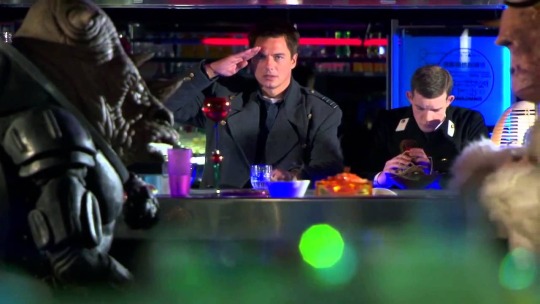
the fact that the song is playing during this scene in the end of time also casts its meaning in a different light: jack has been radically transformed through meeting the doctor just like martha was. from a conman and a coward to an unlikely hero. jack shoulders the burden too. so many lives upended because of this bad bad angel. don’t make crowley jokes
#back on my murray gold bullshit#murray gold#love don’t roam#my angel put the devil in me#daleks in manhattan#evolution of the daleks#doctor who series 3#doctor who#dw#martha jones#ten#tenth doctor#tenmartha#david tennant#freema agyeman#jack harkness#tenjack#the end of time#doctor who series 4#journey’s end#doctor who meta
72 notes
·
View notes
Text

Ordinary Palestinians want to build a prosperous, functioning society. Hamas, in its obsession with annihilating Israel, doesn't care about that. It wishes only to bring about a genocidal Islamist dystopia.
It is Hamas, after all, that holds Palestinians hostage in Gaza, setting up military installations in — and launching rockets from — civilian areas in the full knowledge that counterstrikes will kill innocent people.
It is Hamas that impoverishes Palestinians by stealing humanitarian aid to fund its terror. This is what 'by any means necessary' truly signifies: supreme callousness towards Palestinian life.
If you genuinely want to see peace between Israelis and Palestinians, or more generally between Muslims and Jews in the Middle East, then Hamas should be your enemy.
And even if — like many in the West, as we can now see — you don't care at all about Israeli or Jewish lives, even if you care only about the lives of Palestinians, Hamas is still your enemy. After all, Hamas ruthlessly persecutes any Palestinians who disagree with it: a 2022 U.S. State Department report found that, among other abuses, Hamas detained and assaulted critical journalists.
It is especially hostile to public figures associated with its rival Fatah, the Palestinian party voted out of office in Gaza in 2006, but which still runs the West Bank.
Hamas harasses its own dissidents, and has invaded the home of at least one young critical activist, telling his parents to keep their son under control — or else.
As a Dutch MP in 2004 and 2005, I travelled to the West Bank and met Palestinians.
In public, they spouted all the usual lines about Israel being their 'oppressor'. But once the cameras were switched off, they spoke more truthfully.
They complained bitterly about their treatment by Hamas and other radical groups, and told me how money meant to feed the people was being taken to fund those organisations' activities and their leaders' luxurious lifestyles. Arabs and Palestinians alike told me how fed up they were with conflict, and how ready they were for peace.
Hamas, like other Islamist groups, has done its best over the course of decades to stomp all over those wishes.
And it has been successful. The shocking rise in anti-Semitism in the West owes much to the entrenched Islamist networks that have spent years stirring up this ancient hatred.
Europe must now wake up to these fifth columnists who shamelessly celebrate violence and bigotry, promoting hatred of the Jewish minority in Europe.
The West must also wake up to the moral corruption of its own Hamas supporters, from Left-wing university students to flag-waving street thugs.
Meanwhile, elite human-rights organisations need to do far more to name terrorism when they see it.
It is horrifying to see Amnesty International claiming that one of the 'root causes' of the crisis is 'Israel's system of apartheid imposed on Palestinians'.
Human Rights Watch, meanwhile, should do more than merely equivocating in its insistence that no injustice can justify another.
This is not to argue that Israel should be immune from criticism. My point is that much of the criticism is at best misguided and at worst thinly veiled anti-Semitism.
Hamas, like Lebanon's Hezbollah, Isis in Syria and Iraq, Nigeria's Boko Haram, Somalia's Al-Shabaab and several other groups, are fighting not for the liberty and prosperity of Muslims but, ultimately, for the annihilation of Israel and the imposition of an Islamic state.
If Palestinians and other Muslims have to suffer for that aim, then so be it.
Full article
The emphasis are mine.
120 notes
·
View notes
Text

Minnie Julia Riperton Rudolph (November 8, 1947 – July 12, 1979) was an American singer-songwriter best known for her 1975 single "Lovin' You" and her four octave D3 to F♯7 coloratura soprano range. She is also widely known for her use of the whistle register and has been referred to by the media as the "Queen of the Whistle Register."
Minnie Riperton grew up in Chicago's Bronzeville neighborhood on the South Side. As a child, she studied music, drama and dance at Chicago's Lincoln Center. The youngest of eight children in a musical family, she embraced the arts early. Although she began with ballet and modern dance, her parents recognized her vocal and musical abilities and encouraged her to pursue music and voice. At Chicago's Abraham Lincoln Center, she received operatic vocal training from Marion Jeffery. She practiced breathing and phrasing, with particular emphasis on diction. Jeffery also trained Riperton to use her full range. While studying under Jeffery, she sang operettas and show tunes, in preparation for a career in opera. Jeffery was so convinced of her pupil's abilities that she strongly pushed her to further study the classics at Chicago's Junior Lyric Opera.
The young Riperton was, however, becoming interested in soul, rhythm and blues, and rock. In her teen years, she sang lead vocals for the Chicago-based girl group the Gems. Eventually the group became a session group known as Studio Three and it was during this period that they provided the backing vocals on the classic 1965 Fontella Bass hit "Rescue Me".
After graduating from Hyde Park High School (now Hyde Park Academy High School), she enrolled at Loop College and became a member of Zeta Phi Beta sorority. She dropped out of college to pursue her music career.
Her early affiliation with the legendary Chicago-based Chess Records afforded her the opportunity to sing backup for various established artists such as Etta James, Fontella Bass, Ramsey Lewis, Bo Diddley, Chuck Berry and Muddy Waters. While at Chess, Riperton also sang lead for the experimental rock/soul group Rotary Connection, from 1967 to 1971.
On April 5, 1975, Riperton reached the apex of her career with her No. 1 single "Lovin' You". The single was the last release from her 1974 gold album titled Perfect Angel. Riperton's third album, Adventures in Paradise was released in 1975. Despite the R&B hit "Inside My Love", some radio stations refused to play "Inside My Love" due to the lyrics.
Her fourth album for Epic Records, titled Stay in Love (1977), featured another collaboration with Stevie Wonder in the funky disco tune "Stick Together".
In 1978, Richard Rudolph and Riperton's attorney Mike Rosenfeld orchestrated a move to Capitol Records for Riperton and her CBS Records catalog. In April 1979, Riperton released her fifth and final album, Minnie. "Memory Lane" was a hit from the album.
Riperton provided backing vocals on Stevie Wonder's songs "Creepin'" from 1974's Fulfillingness' First Finale and "Ordinary Pain" from 1976's Songs in the Key of Life. In 1977, she lent her vocal abilities to a track named "Yesterday and Karma", on Osamu Kitajima's album, Osamu.
In January 1976, Riperton was diagnosed with breast cancer and, in April, she underwent a radical mastectomy. By the time of diagnosis, the cancer had metastasized and she was given about six months to live. Despite the grim prognosis, she continued recording and touring. She was one of the first celebrities to go public with her breast cancer diagnosis but did not disclose she was terminally ill.
In 1977, she became a spokesperson for the American Cancer Society. In 1978, she received the American Cancer Society's Courage Award, which was presented to her at the White House by President Jimmy Carter.
Riperton died of cancer on July 12, 1979 at the age 31.
During the 1990s, Riperton's music was sampled by many rap and hip-hop artists, including Tupac Shakur, Dr. Dre, A Tribe Called Quest, Blumentopf, The Orb
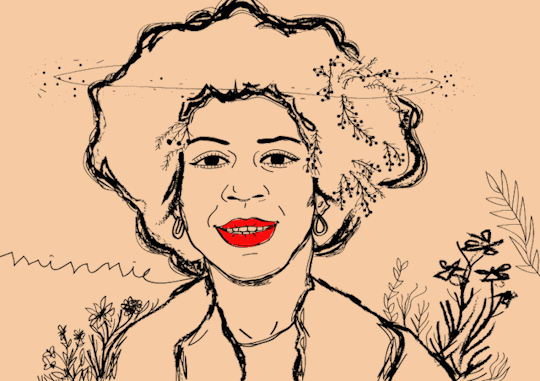

#african#afrakan#kemetic dreams#africans#afrakans#brown skin#brownskin#african culture#afrakan spirituality#riperton#tupac shakur#dr dre#a tribe called quest#the orb#minnie julia riperton#Minnie Julia Riperton Rudolph
249 notes
·
View notes
Note
Not that one poster but I think the revolution will kill thousands of people because that's historically what has happened in every revolution. Even in Palestine you can see civilians and children being killed for daring to revolt, and the disabled also get left behind to die with no accessible medications or hospitals as they've all been bombed. I don't see a way it could work without this happening though so it ends up being a "Some of you may die but that's a price I'm willing to pay", which... Isn't that different from the other side who's also willing to let others die for their ideology.
Source: https://www.google.com/amp/s/www.aljazeera.com/amp/news/2023/10/27/people-with-disabilities-not-spared-from-israels-war-machine-on-gaza-strip
I wasn't trying to argue that in a revolution, nobody would possibly die. I was trying to figure out why, in that person's mind, the two options seem to be "vote for Kamala" or "tens of millions of people die in a four year long revolutionary bloodbath".
Besides, as was already pointed out, people are already dying under capitalism and imperialism and colonialism. The people of Palestine did not fight back for no good reason, they fought back because they were dying at the hands of the Israeli occupation.
I don't think in the United States specifically we're going to suddenly have mass support for revolutionary socialism in the next four years, but for the same reasons, I don't think Trump is going to be able to magically install a fascist dictatorship by virtue of winning another term.
The conditions that provide opportunities for fascists also provide opportunities for socialists. We are in a minor economic downturn at the moment for sure. Prices are going up, wages are still stagnating, lots of people are having to stretch their budgets. But that's ordinary. We have people dying because they can't afford healthcare, and that's horrific, but it's also mundane. It will take an extraordinary economic crisis to push this country onto the brink, and yet such a crisis is inevitable due to the internal contradictions of capitalism.
The relative comfort and stability that the average US citizen experiences is by virtue of the massive poverty and instability that is inflicted on the average person elsewhere in the world. Capitalism and imperialism siphon wealth and labor from the third world and concentrate it in the first world, and any attempts by the masses in the third world to achieve prosperity and security will necessarily disrupt this process. These tensions will inevitably lead to economic collapse within the US and other first world imperialist nations, and this will happen sooner rather than later. Not four years soon, but I would not be surprised if it happened within the next fifty years.
We are not living in a time of peace that a bunch of insane radical leftists are threatening to upend for the sake of ideological purity. We are living in a time where the contradictions of capitalism are once again coming to a head. We are on the brink of another world war. The victory of capitalist counter-revolutionaries in the last century came at the cost of "tens of millions" of lives. Tolerating the imperialist warmongering of US politicians is inexcusable if we are supposed to care about people's lives.
When Kamala Harris brags about the United States having "the most lethal army in the world", she means it. She is more than willing to sacrifice millions of lives on the altar of US hegemony and US control over other nations. The bourgeoisie know full well what is coming and they are already preparing for it. The best time for us to organize was yesterday, and the second best time is today. The Democrats are the enemies of peace and freedom just as much as the Republicans are, and we should not waste our time acting like the former aren't just as eager and willing to throw the rest of us under the bus as the latter are.
33 notes
·
View notes